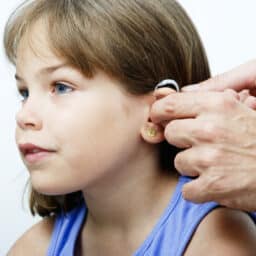Can I Have Tinnitus in One Ear?
Unilateral tinnitus can develop for a variety of reasons ranging from medical conditions to lifestyle factors. Some of the most common causes include: Diagnosing and Managing Unilateral Tinnitus If you are experiencing tinnitus in one ear, it’s important to see a doctor. Ear, nose and throat specialists may use hearing tests, imaging scans and blood…
What to Know About Diplacusis

Diplacusis, also known as “double hearing,” is a condition that causes sounds to be heard at different pitches or times in each ear. While commonly linked to hearing loss, diplacusis can affect anyone and may be more prevalent than people realize. What Is Diplacusis? Diplacusis occurs when the ears process sound inconsistently. The condition is…
Impact of Hormones on Hearing Loss
People may not often think about their hearing health, let alone how hormonal changes may impact it. Interestingly, research suggests that fluctuations in hormone levels, especially estrogen, may impact how well people can hear. The Link Between Hormones and Hearing Hormones act as chemical messengers that influence many bodily functions, including circulation, nerve function and…
Get The Most From Your Hearing Aids with These Care Tips

Hearing aids can change your life for the better by connecting you to a variety of sounds. Taking proper care of your devices helps them last longer and continue help you hear. Here are a few hearing aid care tips from . Clean Your Hearing Aids Regularly Keeping your hearing aids clean makes it easier…
How to Enjoy Concerts with Hearing Loss

According to the National Institute on Deafness and Other Communication Disorders, “One in eight people in the United States (13 percent, or 30 million) aged 12 years or older has hearing loss in both ears, based on standard hearing examinations.” If you’re among this population and you’re planning to see your favorite musical artist live…
Active Listening Techniques for Those with Hearing Loss

Have you ever gone for a long walk and felt completely worn out afterward? You may have felt a similar sense of exhaustion after a prolonged conversation. If that sounds familiar, you’ve likely experienced listening fatigue, a common phenomenon. If you deal with hearing loss and find conversations draining, here are nine tips to help…
Recognizing Hearing Loss in Children

Newborn hearing screenings identify most cases of hearing loss early on, but some forms of hearing loss may develop later due to genetic factors or progressive conditions. Here are some signs to watch for in infants, toddlers and older children to help ensure timely diagnosis and treatment. Hearing Loss Indicators in Infants and Toddlers Infants…
What to Know About Smoking and Hearing Loss

In addition to increasing the risk for conditions such as cancer, heart disease, stroke, lung disease, diabetes and chronic obstructive pulmonary disease (COPD), smoking cigarettes has also been linked to hearing loss. Not only does smoking harm your own health, but it also affects those around you. Below, we delve deeper into the relationship between…
Holiday Travel Tips for Hearing Aid Users

Traveling during the holidays is a busy adventure. With swarms of people running to their gates at Hartsfield-Jackson Atlanta Airport, ordering food and choosing the perfect on-board beverage, it’s easy to feel a little stressed out during travel time. If you’re among the 15% of U.S. adults with hearing loss, this stress can often feel…
What to Know About Sound Machines and Noise-Induced Hearing Loss

Noise-induced hearing loss (NIHL) is caused by exposure to loud sounds over an extended period. The inner ear has sensitive hair cells that can be damaged when exposed to high noise levels, which results in permanent hearing loss. Research suggests that sound machines, often used to help infants sleep, may contribute to this risk if…



